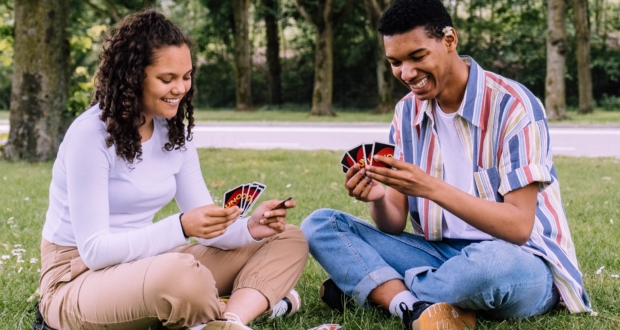What is Flirting and Should Christians Do It?
We’ve all seen it: A single man and woman are talking and laughing a little too much at a party. They’re a little too friendly with one another. Playful, smiley, and affectionate describe their behavior. They’re tapping each other gently on the shoulder and sitting closely as they banter. We know what’s going on – they are flirting.
Flirting can be a catalyst for positive interactions, but at its worst, it can be a deterrent. I’ll explain why.
What is flirting, and how do you know you are doing it?
As my mentor once explained, flirting is an exchange of sexual energy between people. It’s not physical sex, but they are sending ‘sexual vibes’ to each other through their body language, tone of speech, and prolonged eye contact. In the digital realm, flirting involves playful texts, heart emojis, or conversations about romance or personal matters. Whatever form you use, if you’re communicating an attraction to them, you’re flirting.
If only one person flirts, they are alone in expressing their sexual interest. The recipient may or may not flirt back. It’s up to them to interpret the actions as appropriate or inappropriate. In other words, it’s up to the receiver to decide whether it’s creepy or not.
The Dangers of Flirting
But it does have its dangers. Look at my sequence of the five romantic stages of a relationship:
Friendship–>Non-Exclusive Dating (optional)–>Exclusive Dating–>Engagement–>Marriage
If anything, flirting is communication. It expresses a level of romantic interest in another person. The problem is, if the man and woman are just friends and mutually flirting, they communicate at a stage different from the one they are currently in. So their tacit commitment is to friendship, but they are sharing (if mutual) an experience in a further stage. Flirting is exciting at the time but can confuse one or both people.
Or, say you’re flirting with someone you’ve recently met. They’re cute, vivacious, and physically attractive. You’re curious about asking them out or going on a date. At the same time, you’re barely friends. Again, looking at the five stages above, both of you are in the first stage, the Friendship Stage, but by flirting, you’re communicating in at least the Dating Stage. (Dating is mostly likely the first stage where it will be safe to express some sexual attraction.)
In other words, when you’re flirting with someone you’re not in a committed relationship with, you have one foot in friendship and the other in dating. It’s a mixed message, a garbled signal. It can be misleading or worse.
Many people have been hurt or felt manipulated by someone flirting with them. There’s no point in flirting more than once or twice if it’s not validated by an “I like you” or “Would you like to go on a date?”
If a particular woman or man has a reputation as a “flirt,” that’s never a good thing. They were probably given that label for throwing around sexual energy and aren’t serious about starting a relationship with anyone.
Flirting can be sneaky. You might not know you’re flirting in the moment and only realize it later. Similarly, some people are gregarious- they are very friendly with everyone and don’t intend to flirt at all. When we want to be married, it’s easy for us to misinterpret friendliness with flirting.
Years ago, I received a message from a woman I apparently flirted with. She messaged and basically asked, “Are you interested in me?” I didn’t realize I was giving off flirting vibes and apologized.
Positive Aspects of Flirting
On the other hand, flirting has some positive aspects. In moderation and with a purpose, it can be a healthy way of showing or gauging romantic interest in someone. It needn’t be swarmy or gross. Done in moderation, flirting can be light, subtle, and whimsical.
Medically speaking, if flirting were an enzyme, the ensuing reaction to it would be a date. It’s a catalyst and fuel meant to get you a date. Therefore, if you flirt, action must ensue soon after that. Why else would you flirt if you’re not ready to act upon it and ask the person on a date? For fun? For your own pleasure?
When taken at its best, flirting helps you assess the other person’s interest. If they flirt back, that is a good sign (if you’ve read them correctly). If they don’t, that may not mean anything other than they are guarding their heart and waiting for a clear conversation.
Let’s say you’re a guy and have yet to decide whether to ask out a particular woman. You see her at a couple more gatherings and flirt with her again. If she’s responsive to your innuendos, ask her on a date. If you’re not interested, stop flirting with her. Otherwise, if she’s been receptive and likes you, she’ll be frustrated and wonder why you didn’t act since you’re overtly communicating that you’re interested in her but not doing anything about it.
Ladies, the same goes for you. If you flirt, be ready to go on a date with him if he asks you. If you’re not, don’t do it. Or, if he doesn’t take the initiative after a flirting session, cease flirting and don’t offer any more signs that you’re interested. If he continues to do it, call him out.
Optimally, flirting will ignite a progression in the relationship, and you’ll go on a date.
Clear Communication
A long while ago, I was flirting and messaging one woman before I asked her out for coffee. She was seeing someone else and rightfully declined. We messaged for a few days, flirted, and then I communicated my intent to meet her in person. She kindly declined. Graciously, she said, “I could see myself being interested in you, and I’m dating someone. It’s best if we don’t meet.” Did we flirt? Yes. Did I feel flattered? Yes. Was our interaction hurtful? No. The communication and intent was clear. No harm done.
Overall, flirting is exciting but ultimately ambiguous. It’s communicating that you’re attracted to someone but lacks the actual how-about-a-date? conversation. Without a date in the near future, where does flirting leave you? You’re left with swapping undefined sexual energy. If you want to ask them out, why wouldn’t you ask them out?
Flirting might be fun but it’s better to communicate your intentions. Use your words, not your actions. If you flirt, back it up with a date. Don’t write checks that will bounce.
Is Flirting Good or Bad?
When you’re not dating, flirting is like playing with fire. Is it fun? Yes. Does it often burn people? Yes. Flirting is communicating without communicating. It’s saying, “I’m interested,” without saying it out loud. Left unchecked, it’s wildly confusing. You’re sending dating signals to someone but not dating them.
Practically speaking, the answers you need to figure out whether someone is a good match for you won’t come through flirting. It will come through asking lots of questions, interacting with that person on a head level, and seeing if you share the same values and faith in Christ. You’ll know if you’re attracted to them or not.
If you’re three dates in and things are aligning in your heart, you won’t be able to hide your attraction to them. Sexual energy sparks emotional fireworks, but be careful in the beginning with how much you express it.
One side note: There can be a difference between flirting and being curios. The two are divided by a fine line and can even be one and the same. If you’re curious about dating someone and approach them at a Bible study, you’d naturally ask them questions and eagerly respond to their texts, phone calls, or conversations.
Even if you act in “curiosity” and don’t think you’re flirting, those inquisitive interactions will eventually confuse the other person if it is not backed up by a date. Go on a date and explore your curiosity there.
How would you know you’re flirting or being “too curious?” If a third party approached both of you while you were flirting, would they feel awkward? Would they feel as if they’re “interrupting” you? Likewise, would you feel frustrated if they joined your conversation? If either the answer to either of these questions is “yes,” you’re probably flirting.
At this point, you might say, “Eric, you’re taking all the fun out of the relationship!” I promise you I’m not. For one, you’re not in a relationship. Two, an exclusive relationship is where you really enjoy one another because your relationship now has walls to protect it. You can be more of yourself because the person is committed to getting to know you, and you, them.
Should Christian Flirt?
Looking at the five stages of the relationship, flirting should slowly increase as you progress through each one. It will crescendo in marriage.
In fact, flirting is mandatory in engagement and marriage. The exchange of sexual energy supports and enhances your commitment to one another. But in friendship, or even after a few dates, proceed with caution.
Proverbs 4:23 says, “Above all else, guard your heart, for everything you do flows from it.” Christians should be careful with flirting because it often overtakes the protective guards you lay around your heart. Your heart is your precious core. It’s where the Holy Spirit, our intentions, and our decision-making occur. That’s why Jesus says in Luke 6:45, “A good man brings good things out of the good stored up in his heart, and an evil man brings evil things out of the evil stored up in his heart. For the mouth speaks what the heart is full of.”
Consider this if you tend to flirt or desire to flirt: What is your intention? Are you looking to gauge someone’s interest? If so, flirt with caution. Could there be a better way? If you’re chatting with them after church, try gauging their interest by whether or not they’re willing to give you their full attention in the conversation. If they do and you sense they are also curious, pray about asking them on a date.
If you’re receiving the flirting, you can flirt back. But be careful. Whatever you choose, guard your heart because you don’t know what it means. He or she might not know what they want yet. Worse, they could be flirting with many people.
The last and safest option is not to flirt at all. Save it until you have a committed relationship, but ramp it up in engagement and marriage.
Again, flirting is an exchange (or demonstration) of sexual energy. It’s ethereal, and it can be challenging to define. It’s expressing sexual desire, however subtly, to another person.
Let it be sown in dating, bloom in engagement, and come to fruition in marriage. When you’ve exchanged rings, you can fully express your flirtations with actual sex.
If you communicate clearly and saving flirting for later, you’ll guard your heart, their heart, and set up your relationship to be guided by the Holy Spirit, not your hormones.
What are your thoughts?









Leave a Reply